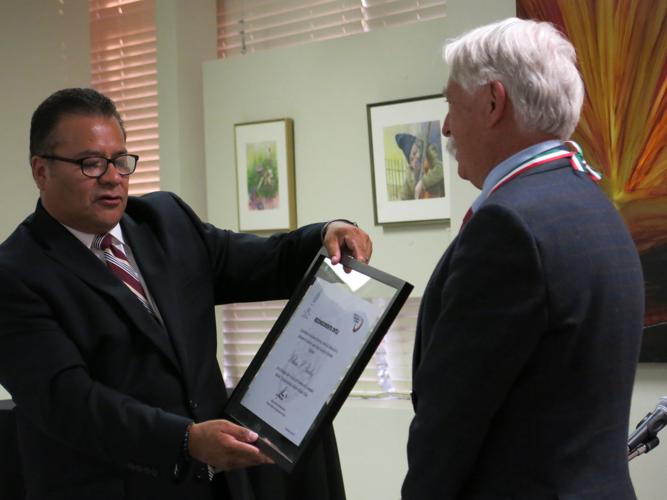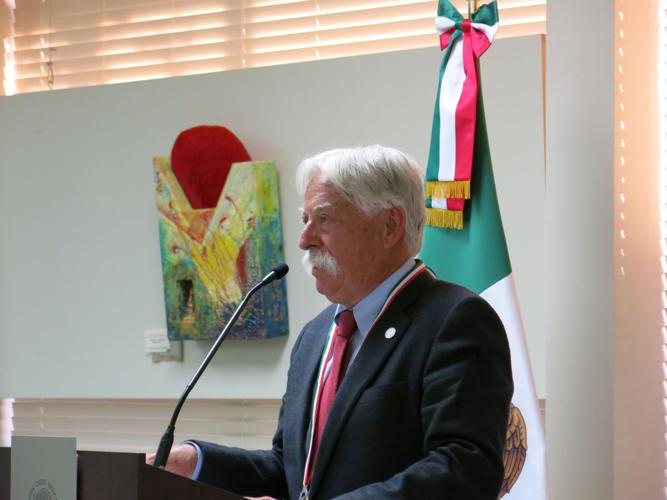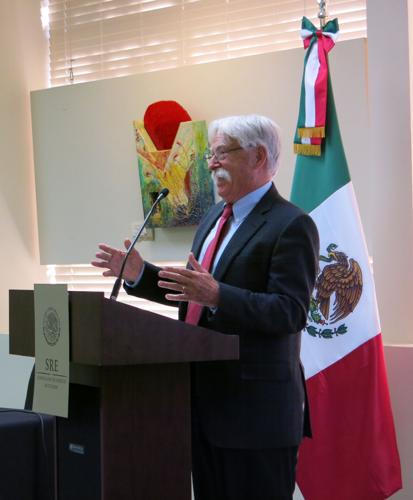After nearly five decades of study and research about modern Mexican history, the publication of 28 books and countless articles, and too-many-to-count seminars and panel discussions, 75-year-old University of Arizona history professor William Beezley still has several books left in him.
But who’s counting.
The Mexican government did, and in honor of Beezley’s scholarly contributions to the critical study of Mexican history, it bestowed on him the highest recognition that Mexico confers to people outside its country. Wednesday night, Beezley received the Ohtli award in a ceremony at Tucson’s Mexican consulate. Consul Ricardo Pineda Albarran conferred the award to Beezley, internationally known for his work focusing on the changes and challenges since the 1910 Mexican Revolution.
“The government of Mexico awarded Dr. Beezley the Ohtli prize as a recognition of his countless works about the history of Mexico, its people, its culture and its traditions, which have been instrumental in bringing a better understanding between our two countries,” said Pineda in a news release.
The award is a big deal. It is usually given to Mexican-Americans who have worked to forge closer ties between the two countries. The award has been previously given to Congressman Raúl Grijalva, human rights activist Isabel Garcia and former Sunnyside Unified School District superintendent Raul Bejarano. Tucson Mayor Jonathan Rothschild was a recent recipient.
Beezley, in a visit the morning of the award ceremony in his book-filled office on campus, said he was proud but modest about the award. He said the award is not just for him but also for the other outstanding scholars, on both sides of the border, who have to labored to understand Mexican history and culture. “We all bring different appreciation of aspects of Mexican history and culture. It’s that diversity of efforts that brings an appreciation,” he said.
While Beezley and other historians have applied their magnifying glasses to the centuries of Mexican history and the far shorter history of U.S.-Mexico relations, their work, sadly, has gone unappreciated by the vast majority of Americans. That’s even so for the millions of people who live along the 2,000-mile border corridor.
In short, most Americans know little to nothing about Mexican history and now it relates to our history, and the collective ignorance is nothing to brag about.
“We’re becoming a Mexican-American culture,” said the professor. Understanding Mexican and U.S.-Mexico histories are critical to understanding the dynamics of significant changes in our country, he added.
Whether the discussion is about immigration, trade, education, binational security, the environment or the economy, understanding those issues and how be resolve differences between the countries is highly dependent on understanding history.
Beezley, who was born in Albuquerque and grew up in Denver, came to study Mexican history while an undergrad at Chico State College in California. He went to the University of Nebraska for graduate school where he studied under Michael C. Meyer, a renowned Mexican historian who later came to the UA. Beezley eventually followed his mentor to Tucson in 1998.
In his career, Beezley has taught in Texas, North Carolina and New York, and has been a visiting professor in Mexico, Canada and Colombia. Some of his books include “Judas at the Jockey Club and Other Episodes of Porfirian Mexico,” “Mexicans in Revolution, 1910-1946: An Introduction” and “The Oxford History of Mexico,” which he co-edited with Meyer.
Beezley also appeared as an expert guest on more than 20 episodes of “The Desert Speaks” and “In the Americas With David Yetman,” two locally produced series for public television. Other books Beezley has in the works include an examination of Latin American culture and Mexican democracy.
Not bad for someone who had considered another field of study.
“My plan was to be a botanist,” Beezley said.
But the winds of Mexican history swept him away and he’s never looked back.
He’s humble with the acknowledgment of his work. And being a historian, Beezley views the recognition, in a different way, like a rolling stone.
“Who would have thought 50 years ago that Bob Dylan would have received a Nobel Prize and I would be honored by the Mexican government,” said Beezley.






